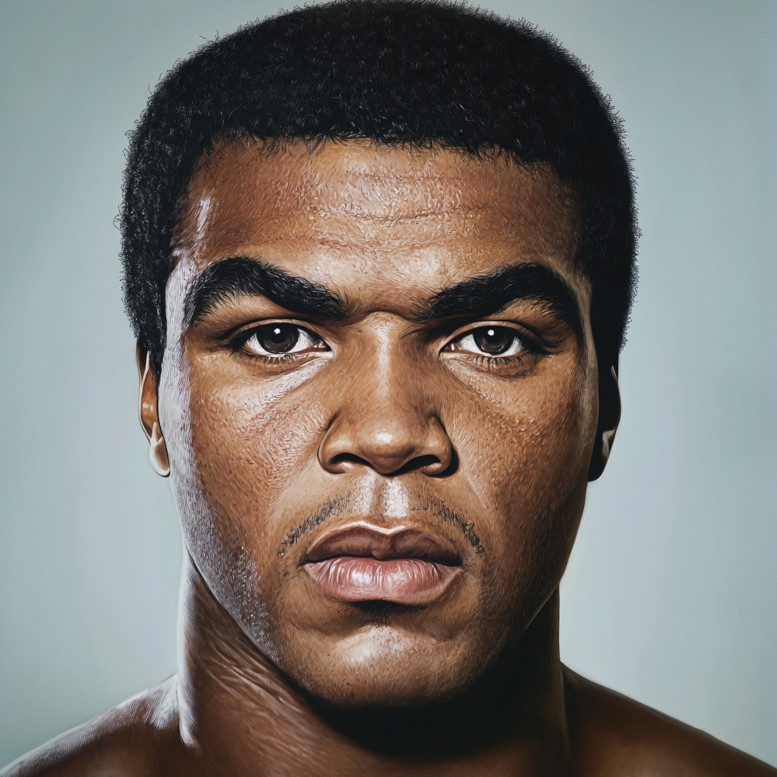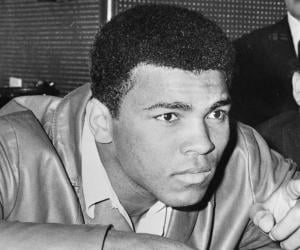Muhammad Ali (1942–2016), born Cassius Marcellus Clay Jr., was an American professional boxer, activist, and cultural icon widely regarded as one of the greatest boxers of all time. Known for his charismatic personality, quick wit, and outspoken nature, Ali became a global symbol of strength, courage, and conviction both inside and outside the ring. His contributions to sports, civil rights, and social justice have left an indelible mark on history.
Early Life and Background
Birth and Family Background: Muhammad Ali was born on January 17, 1942, in Louisville, Kentucky, to Cassius Marcellus Clay Sr., a sign painter, and Odessa O'Grady Clay, a domestic worker. He was named after his father, who in turn was named after a 19th-century abolitionist and politician. Growing up in the segregated South, Ali experienced racial discrimination from an early age, which would later influence his activism.
Introduction to Boxing: Ali's introduction to boxing came at the age of 12, when his bicycle was stolen. He reported the theft to a police officer, Joe Martin, who also happened to be a boxing coach. Martin suggested that young Cassius learn how to fight if he wanted to confront the thief. Ali took up the offer and began training under Martin. His natural talent and determination quickly became apparent, and by the age of 18, he had won two national Golden Gloves titles and an Olympic gold medal in the light heavyweight division at the 1960 Rome Olympics.
Boxing Career and Achievements
Professional Debut and Rise to Fame: After his Olympic victory, Ali turned professional in 1960 and quickly made a name for himself with his brash personality and dominant performances in the ring. His unorthodox fighting style, characterized by his speed, agility, and ability to "float like a butterfly, sting like a bee," set him apart from other heavyweights.
World Heavyweight Champion (1964): Ali's breakthrough came in 1964 when he challenged the reigning heavyweight champion, Sonny Liston. Despite being an underdog, Ali confidently predicted victory, famously declaring, "I'm gonna float like a butterfly and sting like a bee. His hands can't hit what his eyes can't see." True to his word, Ali defeated Liston in a stunning upset to become the heavyweight champion of the world. Shortly after the fight, Ali announced his conversion to Islam and changed his name from Cassius Clay to Muhammad Ali, rejecting what he called his "slave name."
Vietnam War and Stripped Title: In 1967, at the height of his career, Ali faced a major challenge outside the ring. He refused to be drafted into the U.S. military during the Vietnam War, citing his religious beliefs and opposition to the war. Ali famously stated, "I ain't got no quarrel with them Viet Cong. No Viet Cong ever called me n****r." His refusal led to his arrest, a conviction for draft evasion, a $10,000 fine, and the stripping of his boxing titles. Ali was also banned from boxing for three and a half years during what could have been the prime of his career. His stand against the draft made him a symbol of resistance and civil rights, but it also came at great personal and professional cost.
Return to Boxing and the "Fight of the Century": After his conviction was overturned by the U.S. Supreme Court in 1971, Ali returned to the ring and quickly regained his status as one of the top heavyweights. His 1971 fight against Joe Frazier, billed as the "Fight of the Century," was one of the most highly anticipated bouts in boxing history. Although Ali lost by unanimous decision, the fight solidified his reputation as a resilient and fearless competitor.
The Rumble in the Jungle and the Thrilla in Manila: Ali regained the heavyweight title in 1974 by defeating George Foreman in the historic "Rumble in the Jungle" in Kinshasa, Zaire (now the Democratic Republic of the Congo). Using a strategy known as the "rope-a-dope," Ali absorbed Foreman's powerful punches and then took advantage of his opponent's exhaustion to knock him out in the eighth round. The fight is widely regarded as one of the greatest in boxing history.
Ali's third and final fight against Joe Frazier, known as the "Thrilla in Manila," took place in 1975 and is considered one of the most brutal and epic battles in boxing. Ali emerged victorious after Frazier's trainer stopped the fight before the 15th round, but both fighters were left physically and emotionally drained.
Later Career and Retirement: Ali continued to fight until 1981, although his skills and reflexes had noticeably declined by the late 1970s. He lost his title to Leon Spinks in 1978 but regained it later that year, becoming the first boxer to win the heavyweight championship three times. After a few more fights, including losses to Larry Holmes and Trevor Berbick, Ali retired from boxing with a record of 56 wins, 5 losses, and 37 knockouts.
Social Activism and Legacy
Civil Rights and Activism: Throughout his life, Muhammad Ali was a vocal advocate for civil rights, social justice, and religious freedom. His refusal to be drafted during the Vietnam War, his outspoken views on race, and his embrace of Islam made him a controversial figure in the 1960s. However, as public opinion shifted, Ali came to be seen as a hero for his courage and willingness to stand up for his beliefs, even at great personal cost.
Ali's activism extended beyond the United States. He traveled the world as a goodwill ambassador, using his fame to advocate for humanitarian causes and to promote peace. His conversion to Islam and his public embrace of the religion also had a significant impact, particularly within the African American community.
Parkinson's Disease and Later Years: In 1984, Ali was diagnosed with Parkinson's disease, a degenerative neurological condition that gradually impaired his speech and motor skills. Despite his declining health, Ali remained active in public life, continuing to promote charitable causes and serving as an inspiration to millions around the world. He lit the Olympic flame at the 1996 Atlanta Games, a moment that symbolized his enduring legacy and resilience.
Awards and Honors: Muhammad Ali received numerous accolades throughout his life, including the Presidential Medal of Freedom, which he was awarded in 2005 by President George W. Bush. In 1999, he was named "Sportsman of the Century" by Sports Illustrated and "Sports Personality of the Century" by the BBC.
Death and Legacy
Muhammad Ali passed away on June 3, 2016, at the age of 74, after being hospitalized with respiratory complications. His death prompted an outpouring of grief and tributes from around the world. Ali's funeral, held in his hometown of Louisville, Kentucky, was attended by thousands, including world leaders, athletes, and celebrities, reflecting the global impact of his life and legacy.
Cultural Impact and Legacy: Muhammad Ali's influence extends far beyond the boxing ring. He redefined what it meant to be an athlete, using his platform to speak out on issues of social justice, race, and religion. Ali's charisma, confidence, and wit made him a beloved figure, while his courage and conviction made him a symbol of resistance and empowerment.
Ali's impact on sports, culture, and society is immeasurable. He inspired generations of athletes to use their voices for change and remains a powerful symbol of what it means to stand up for one's beliefs. His life and legacy continue to inspire people around the world, making him not just a boxing legend but a global icon.
Muhammad Ali was more than just a champion boxer; he was a cultural and social icon whose influence transcended sports. His accomplishments in the ring were matched by his impact outside of it, as he championed civil rights, spoke out against injustice, and became a global ambassador for peace and understanding. Ali's legacy as "The Greatest" will endure for generations, and his life story serves as a testament to the power of conviction, courage, and resilience.



